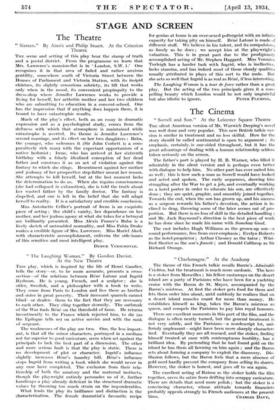The Cinema
"Sorrell and Son." At the Leicester Square Theatre TIIE silent American version of Mr. Warwick Deeping's novel was well done and very popular. This new British talkie ver- sion is similar in treatment and no less skilful. How far the story should be called sentimental is open to argument ; its emphasis, certainly, is one-sided throughout, but it has the great advantage of dealing with a human relationship seldom taken seriously on the sereen.
The father's part is played by H. B. Warner, who filled it admirably in the silent version and is perhaps even better with dialogue to help him. No other part has ever suited him so well ; this is how such a man as Sorrell would have looked and acted and spoken. The early sequences, showing him struggling after the War to get a job, and eventually working as a hotel porter in order to educate his son, are effectively done ; they are quiet, graphic, and smoothly joined together. Towards the end, when the son has grown up, and his success as a surgeon rewards his father's devotion, the action is in- clined to drag, throwing some of the later scenes out of pro- portion. But there is no loss of skill in the detailed handling ; and Mr. Jack Raymond's direction is the best piece of work he has done since he made his name with Somehow Good.
The cast includes Hugh Williams as the grown-up son—a sound performance, free from over-emphasis ; Evelyn Roberts as the hotel-proprietor ; Arthur Chesney as the tutor ; Wini- fred Shotter as the son's fiancée ; and Donald Calthrop as Sir Richard Orange.
















































 Previous page
Previous page